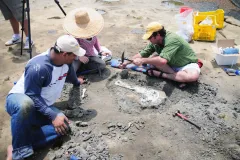Expedition to Excavate a Fossil Whale

My graduate student Jorge and I are departing today for Panama, to excavate a fossil whale that was discovered by an undergraduate student working with Smithsonian Tropical Research Institute researcher, Aaron O'Dea.
From extensive conversations with Aaron, and some excellent preliminary photos, it seems that the fossil whale (consisting of a skull and a shoulder blade, so far) belongs to a group of completely extinct toothed whales called Squalodontidae.
If you're familiar with Latin roots, their taxonomic name reveals a key diagnostic feature of these extinct whales: they possess unusally serrated teeth, like the shark Squalus, which has inspired their shorthand as the "shark-toothed dolphins." Fossils belonging to this group have been found all over the world: first in France, in the 19th century, and then in North America, and even New Zealand. It's not surprising that such a globally distributed marine mammal would find themselves in central America, but the discovery will be a new occurrence for this group nonetheless.
The fossils are located in the middle of tidal environment, and already much of the skull has been lost to erosion. Our mission is to excavate and encase the remaining parts in a plaster jacket -- but we only have a narrow time interval to accomplish this goal because of the tides. So, we're hoping to get out to the locality on Saturday morning, excavate, jacket, and then be done all in the same day.
Jorge and I have packed our field bags with mostly the standard equipment: field pants; walkie talkies; bandanas and hat; pocket knives; field notebook; rock hammer; GPS; plaster and (undissolved) glue. (See how many of these you can spot in the picture above!). I'll highlight one unusual item in particular: Fisherman's Friend, a throat lozenge. Apparently, Aaron's daughter eats them as if they are going out of style, and you can't find them in Panama.
We'll check in again once we're in Central America!

